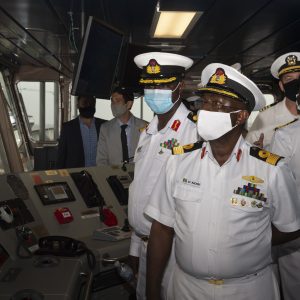
Maritime security – who’s in charge?
Several international instruments to which Nigeria is legally bound call for the preservation of maritime security. As such, it is imperative to understand which agencies should be held accountable for protecting Nigeria’s waters.
Statutory functions of various agencies
Nigerian Navy
The Nigerian Navy arguably has the primary responsibility for protecting the country’s waters. Section 1(4)(a) of the Armed Forces Act (Ch 20 LFN 2004) establishes the navy and lists its statutory functions as:
“(i) enforcing and assisting in co-ordinating the enforcement of all customs, laws, including anti-bunkering, fishery and immigration laws of Nigeria at sea;
(ii) enforcing and assisting in co-ordinating the enforcement of national and international maritime laws ascribed or acceded to by Nigeria;
(iii) making of charts and co-ordinating of all national hydrographic surveys; and
(iv) promoting, co-ordinating and enforcing safety regulations in the territorial waters and Exclusive Economic Zone of Nigeria.”
At a glance, the navy’s statutory functions appear to be all encompassing, as it is charged with enforcing and assisting in coordinating the enforcement of all laws at sea. This includes enforcing the international maritime laws ascribed or acceded to by Nigeria and promoting and enforcing safety regulations in the country’s territorial waters and exclusive economic zone.
Nigerian Police Force
The Constitution 1999 (as amended) confers on the Nigerian Police Force security functions concerning maritime security. For example, Section 214(2) of the Constitution states as follows:
“Subject to the provisions of this Constitution
- the Nigeria Police Force shall be organised and administered in accordance with such provisions as may be prescribed by an act of the National Assembly;
- the members of the Nigeria Police shall have such powers and duties as maybe conferred upon them by law;
- the National Assembly may make provisions for branches of the Nigeria Police Force forming part of the armed forces of the Federation or for the protection of harbours, waterways, railways and air fields.” (Emphasis added.)
Nigerian Maritime Safety and Administration Agency
The Nigerian Maritime Safety and Administration Agency is also charged with ensuring the security of Nigerian waters. A combined reading of Sections 22(1) and 22(4) of the Nigerian Maritime Safety and Administration Agency Act 2007, as well as Section 2(1) of the Merchant Shipping Act 2007, places the agency in charge of:
- flag and port state control;
- search and rescue; and
- aerial and coastal surveillance.
The agency is pivotal to protecting Nigeria’s waters, as it is statutorily required to do so under Section 22(1)(k) of the Nigerian Maritime Safety and Administration Agency Act, which reads as follows:
“establish the procedure for the implementation of conventions of the International Maritime Organisation and the International Maritime Labour Organisation and other international conventions to which the Federal Republic of Nigeria is a party on Maritime Safety and Security, Maritime Labour, Commercial Shipping and for the implementation codes, resolutions and circulars arising therefrom.” (Emphasis added.)
A literal interpretation of this section places the agency in the primary supervisory position, deeming it responsible for establishing the procedure to implement the relevant international conventions in Nigeria. In addition to this role, the agency is still statutorily required to:
- inspect vessels for compliance;
- administer maritime policy; and
- “perform any other duty for ensuring maritime safety and security or do all matters incidental thereto”.
Practical reality
There appears to be some level of cooperation across the relevant agencies in Nigeria in ensuring that the country’s waters are kept safe. However, the lines are blurred with regard to the delineation of these agencies’ maritime security functions. In practice, consequent to several factors – such as a lack of adequate resources – these agencies are somewhat limited to operating in different areas of Nigeria’s maritime zones.
For example, the Nigerian Police Force operates along the country’s coastline and internal waters and has a strong presence in the country’s ports. Conversely, the navy’s operating limits are clearly defined in Section 1(4)(a)(iii) of the Armed Forces Act, under which it is tasked with promoting, coordinating and enforcing safety regulations in Nigeria’s territorial waters and exclusive economic zone.
This provision inadvertently buttresses the reality of the navy playing a more active role outside Nigeria, thereby allowing the police and the Nigerian Maritime Safety and Administration Agency to play a more visibly active role in Nigeria and its ports. The navy is not restricted from acting in inland waters, as is clearly demonstrated in its operations in the Niger Delta region (as part of the joint task force).
The Nigerian Maritime Safety and Administration Agency also works closely with both the Nigerian Police Force and the navy in ensuring the successful implementation of a number of international conventions which the country has acceded to or ratified (e.g., cooperating with these agencies, together with others, in implementing the International Ship and Port Facility Security Code).
Comment
The statutory functions of the relevant Nigerian agencies with regard to maritime security are interwoven in nature. In practice, these agencies operate within particular maritime zones owing to a variety of factors. There is a need for Nigeria’s legislature to revisit the relevant legislation that establishes these agencies and it to allow for a proper demarcation of the functions of these bodies with regard to the protection of Nigeria’s waters.
For further information on this topic please contact Ngozi Medani at Akabogu & Associates by telephone (+234 1460 55550) or email (ngozi@akabogulaw.com). The Akabogu & Associates website can be accessed at www.akabogulaw.com.
The materials contained on this website are for general information purposes only and are subject to the disclaimer. ILO is a premium online legal update service for major companies and law rms worldwide. In-house corporate counsel and other users of legal services, as well as law rm partners, qualify for a free subscription.
